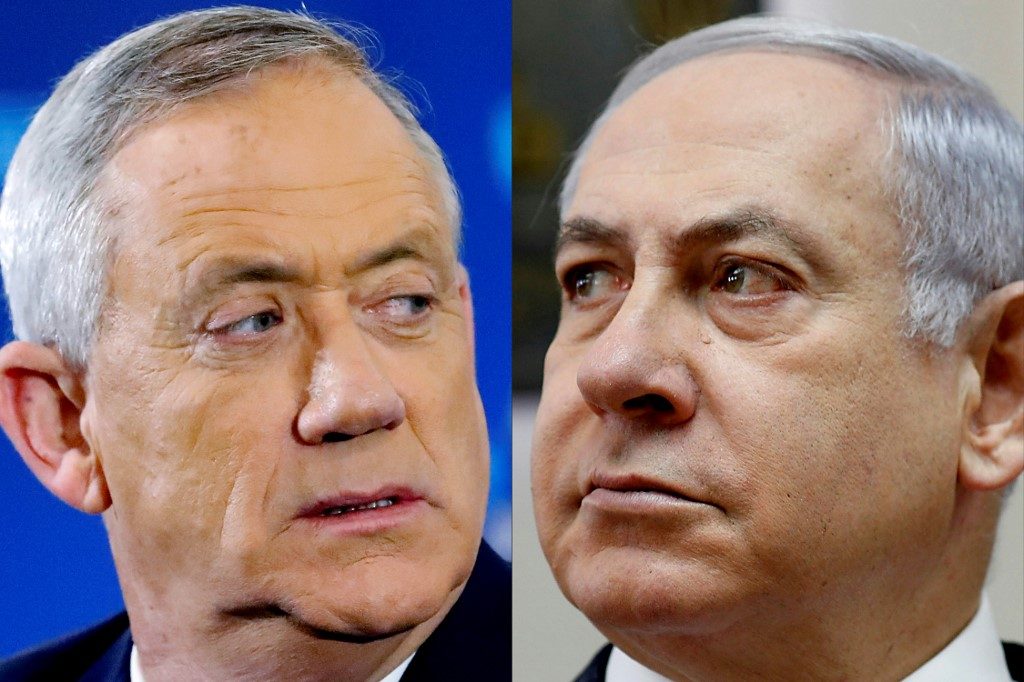SUMMARY
This is AI generated summarization, which may have errors. For context, always refer to the full article.

JERUSALEM (UPDATED) – Israel’s parliament was tasked with forming a government on Thursday, April 16, after speaker Benny Gantz and Prime Minister Benjamin missed a deadline to seal an alliance, but negotiations between the sides were ongoing.
Israel’s deeply divided 120-member parliament has no clear path towards a stable governing coalition, so the move risks prolonging the country’s worst-ever political crisis.
But despite missing the Wednesday, April 15, deadline, Gantz and Netanyahu could still agree on an emergency unity government to help Israel confront the COVID-19 pandemic.
In a joint statement, Gantz’s Blue and White and Netanyahu’s Likud said negotiators had resumed Thursday “toward establishing a national emergency government.”
Following a March 2 election, Israel’s third inconclusive vote in less than a year, Gantz was given 4 weeks to form a coalition.
After he was elected speaker late last month, the centrist ex-military chief pledged to form an emergency unity government with the right-wing Netanyahu who has been prime minister since 2009.
Power sharing
Gantz conceded that Netanyahu would lead that government as prime minister, at least to begin with, as Israel faces an unprecedented health crisis that has exacted a devastating economic toll.
The two have discussed various power-sharing options, including scenarios that would see Gantz take over as premier after 18 months, with ministerial positions split between Blue and White and Likud.
After assuring President Reuven Rivlin that they were close to agreement, Gantz and Netanyahu were given until the end of Wednesday to reach a deal.
The deadline passed without any announcement of a breakthrough.
Rivlin then officially informed Gantz that his mandate had expired and that the task of forming a government now passed to parliament.
Rivlin’s move gives lawmakers 21 days to nominate one of their number to form a government. That nominee would then have two weeks to build a coalition.
They could select Gantz, Netanyahu or someone else.
“The most likely scenario remains a unity government,” said Jonathan Rynhold, a political science professor at Bar Ilan University.
“But that is by no means certain,” he added, noting there could be another election.
Fourth election?
Rivlin implored lawmakers to find a solution that avoids another vote. He called the latest campaign “awful (and) grubby” and expressed embarrassment that political leaders have been unable to compromise.
But polls have found Netanyahu’s support has risen during the COVID-19 crisis.
Gantz’s decision to seek a deal with Netanyahu triggered the break-up of Blue and White, dramatically weakening his political position.
Former top Blue and White leader Yair Lapid, who split from Gantz last month, charged that unity talks could create a government that becomes “a national disaster.”
Lapid, a lawmaker and bitter Netanyahu foe, called for a six-month freeze in the political process, during which the current caretaker government would work with parliament to guide Israel through the pandemic.
“A freeze isn’t ideal…but its better than crawling into a corrupt government. It’s better than fourth elections,” Lapid said.
Many commentators have suggested that Netanyahu wants to draw out unity talks before forcing Israel into another election, hoping he will finally win the absolute majority he needs both to remain in power and to pass legislation that would shield him from prosecution over longstanding corruption allegations.
The prime minister was indicted in January with bribery, fraud and breach of trust, but denies all charges.
Gideon Rahat, a political science professor at the Hebrew University of Jerusalem, told Agence France-Presse that “buying time” is in Netanyahu’s interest.
But, as Rynhold noted, Netanyahu’s current solid polling could simply be “rallying around the flag” during a global crisis and may erode by the time an election is held.
Rynhold agreed with other experts that the key stumbling block in unity talks is control of the justice ministry and judicial nominations, particularly those connected with overseeing Netanyahu’s graft case. – Rappler.com
Add a comment
How does this make you feel?
There are no comments yet. Add your comment to start the conversation.